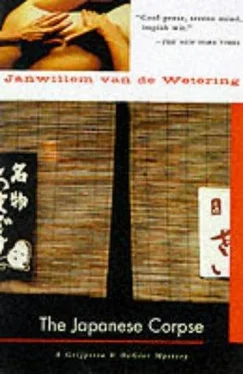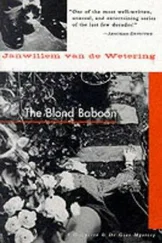Janwillem De Wetering - The Japanese Corpse
Здесь есть возможность читать онлайн «Janwillem De Wetering - The Japanese Corpse» весь текст электронной книги совершенно бесплатно (целиком полную версию без сокращений). В некоторых случаях можно слушать аудио, скачать через торрент в формате fb2 и присутствует краткое содержание. Жанр: Полицейский детектив, на английском языке. Описание произведения, (предисловие) а так же отзывы посетителей доступны на портале библиотеки ЛибКат.
- Название:The Japanese Corpse
- Автор:
- Жанр:
- Год:неизвестен
- ISBN:нет данных
- Рейтинг книги:3 / 5. Голосов: 1
-
Избранное:Добавить в избранное
- Отзывы:
-
Ваша оценка:
- 60
- 1
- 2
- 3
- 4
- 5
The Japanese Corpse: краткое содержание, описание и аннотация
Предлагаем к чтению аннотацию, описание, краткое содержание или предисловие (зависит от того, что написал сам автор книги «The Japanese Corpse»). Если вы не нашли необходимую информацию о книге — напишите в комментариях, мы постараемся отыскать её.
The Japanese Corpse — читать онлайн бесплатно полную книгу (весь текст) целиком
Ниже представлен текст книги, разбитый по страницам. Система сохранения места последней прочитанной страницы, позволяет с удобством читать онлайн бесплатно книгу «The Japanese Corpse», без необходимости каждый раз заново искать на чём Вы остановились. Поставьте закладку, и сможете в любой момент перейти на страницу, на которой закончили чтение.
Интервал:
Закладка:
"Jealousy," Jane said. "Is that what you mean?"
"Yes."
"Somebody killed Mr. Nagai because she was going to marry him?" She giggled. "Isn't that rather old-fashioned these days? I saw a program about partner-exchange on TV last night. It seems that everybody sleeps with everybody these days."
The commissaris laughed too. "Yes. But men will always be jealous. She hasn't mentioned other men? You two must have talked a lot, two women in one house."
"No. She doesn't say much, a very quiet girl. She has been good company, I'll be sorry to see her go."
"Try to find out," the commissaris said. "I'll ring again, maybe tomorrow. The killer wasn't a white man, I think. We have witnesses who saw a man wash the car the murder was committed in, and who saw a man buy a spade. Probably the same man, probably the killer. In both instances the events took place close to where the corpse was found. And the witnesses described the man as a Chinese. That's the closest they can get to Japanese, they wouldn't know what a Japanese looks like."
"I know what a Japanese man looks like," the commissaris' niece said. "They used to beat me up at least once a month, just so that I would remember my manners."
"Yes, dear, but you have traveled. I have confronted the witnesses with the two suspects we hold in jail. The suspects were brought in one by one. First the witnesses said they had seen the first man, but when they saw the second suspect, they weren't sure anymore. Very likely, neither suspect was involved with the death of Mr. Nagai."
"I see," Jane said. "So what now?"
"Well, we'll find the third man, dear, the man who did it. And I am sure Joanne Andrews knows that third man very well. And you can find out who he was and then I'll have him picked up for questioning. Proper police procedure, there's nothing to it really."
There was a pause.
"Your adjutant phoned yesterday, you know," Jane said. "He is coming over this afternoon. He wanted to speak with Joanne."
The commissaris sighed.
"Are you there?"
"I am here. Never mind, dear, forget what I told you to find out. The adjutant is following the same line of reasoning that I am. He'll report to me. Just give him any information he asks for. He is a very nice man, you'U like him. Don't tell him I phoned. I am only fussing anyway. The adjutant is an experienced detective and the case is in good hands with him."
"All right. So are you enjoying yourself? Any geisha parties?"
"Yes," the commissaris said. "We are being wined and dined every day, and they have devised some special entertainment for us, rather fascinating. Maybe I'll tell you about it one day."
"Be careful, dear," Jane said. "I got to know the Japanese well when I was in their camp during the war. They are not like us. They react differently and they can be very cruel and they think before they act, even in anger."
"Yes."
"But they have different qualities too, they are sensitive and creative. They nearly starved and beat me to death, but I sometimes think I wouldn't really have wanted to miss the experience. Those four years changed me. I enjoy many things now I would never have noticed before."
"Maybe because you are a little older," the commissaris said.
"I am not old, I am as old as you are."
"I am very old," the commissaris said, "and my legs hurt. I was running this morning. Goodbye, dear, I'll call tomorrow. Can you stay in till I phone?"
"Yes," she said, and rang off.
The commissaris grunted. Then he picked up the phone again. The ambassador was in and he was connected immediately. He could imagine the big man sitting in a large room, under the portrait of the queen and with a Dutch flag in the corner. He had seen the Dutch embassy in Tokyo but he hadn't gone in.
"How are you doing?" the ambassador asked.
The commissaris described the adventures of the morning. The ambassador made the appropriate sounds of commiseration.
"Well, well," he said, "I hope you weren't too upset. But it means we are making contact. The CIA will be interested. Mr. Johnson wanted to go to Kyoto, but I advised against it. There aren't too many foreigners in Kyoto at this time of the year and he would be too conspicuous. He is in Kobe now. It's all right in Kobe; there are thousands of Westerners milling about over there. I think you should pretend to buy some of the scrolls and whatever else the priest brings you, and get out. I hear you had the bodyguards called off. You have only the sergeant and Dorin to protect you now, right?"
"Right."
"Well, you'll have to move quickly. We don't want anything to happen to you; it would cause all sorts of complications. You have the emergency telephone number?"
"Yes."
"Good luck, sir, I'll be thinking of you. You are doing the country a great favor. Did you read that book on Deshima which I had delivered to your hotel?"
"Yes," the commissaris said, and smiled. "I liked the passage about the women."
"The keisei? Yes, our forefathers must have had a good time on the island, far removed from their nagging Dutch wives and screaming children, and cuddled by specially selected high-class prostitutes, supplied by the Japanese government, free of charge. A most interesting setup. Do you know what 'keisei' means?"
"No."
"Destroyers of walls. They were there to ease the communication between the Dutch and Japanese merchants, and they must have done a good job. Sales were booming, both ways. They were buying our guns and ships and the primitive machinery we had in those days, and we were buying their scrolls and earthenware and fans. We must have bought millions of fans."
"The priest said he would bring us some fans today. He said they came from a geisha house and are a few hundred years old. I wonder how they got to his temple?"
"Priests are men," the ambassador said. "Ordinary men. They don't only meditate and chant the sermons of the Buddha."
"Yes," the commissaris said. "Quite."
\\\\\ 16 /////
Dorin looked impeccable in a light summer suit complete with a white shirt and a narrow tie. The commissaris eyed him pensively. Since he had been tricked into finding the mask and losing his self-control, he felt a cold hatred against practically everything around him. The room with its long parallel lines of beams, slats and walls, the floor with the neat tatamis, each bordered by a cotton strip showing small neat repeating flower designs, the view of the green and silvery-gray moss garden frightened and nauseated him. The feeling would pass, but he kept on seeing the trickle of blood on his own chin and the glasses that had slipped off his nose and were dangling from one ear. His own ear, a wooden ear on a perfect wooden mask. The student and the monk, smiling kindly, had lured him into facing a fear he thought he didn't have. He was, he supposed, angry with himself. The anger of disappointment.
He sighed and forced himself to smile at Dorin, who was sitting on a cushion opposite de Gier. The commissaris had pulled his mattress out of the cupboard and was lying down, his head propped up on his arm. Dorin had tucked his legs into each other and each foot rested on the opposite thigh. The commissaris could see the naked soles, for Dorin had taken off his socks and put them in the sidepocket of his jacket. Strange habits, the commissaris thought. There had been an elderly man in the train who had calmly taken off his trousers, folded them and put them next to his small suitcase on the luggage rack. He had taken his socks off too and folded his legs. He had been wearing long underpants. In Holland such behavior might have caused an uproar, a quiet uproar, for they had been traveling first class.
He looked at Dorin again. The man's face was calm, withdrawn. The commissaris reminded himself that Dorin was collaborating with them. A friend. And Dorin had been very friendly. He had shown a continuous concern for their welfare and comfort. He wondered what Dorin would be like as an enemy. Was the man capable of thinking of the creation of a wooden mask? Would he stage the death of the sergeant? Perhaps he would. Perhaps such tricks were fair play in the game. It was a game after all, wasn't it? Hadn't he always agreed with the Chinese philosophers he had been reading in Holland for so many years? Nothing on this planet is real; a game played by shadows. So why was he upset? But he was, to the point of feeling bilious.
Читать дальшеИнтервал:
Закладка:
Похожие книги на «The Japanese Corpse»
Представляем Вашему вниманию похожие книги на «The Japanese Corpse» списком для выбора. Мы отобрали схожую по названию и смыслу литературу в надежде предоставить читателям больше вариантов отыскать новые, интересные, ещё непрочитанные произведения.
Обсуждение, отзывы о книге «The Japanese Corpse» и просто собственные мнения читателей. Оставьте ваши комментарии, напишите, что Вы думаете о произведении, его смысле или главных героях. Укажите что конкретно понравилось, а что нет, и почему Вы так считаете.












